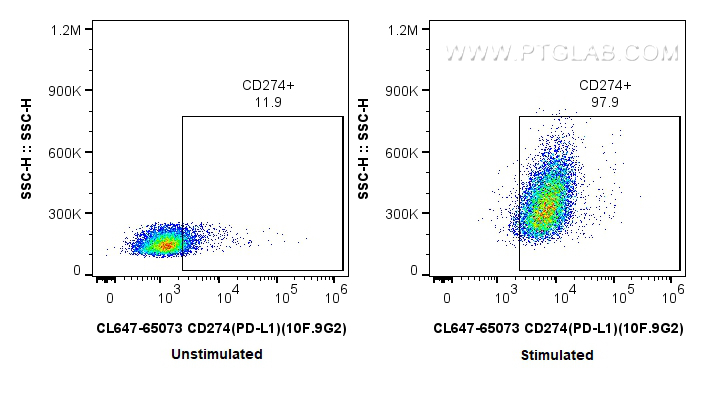验证数据展示
经过测试的应用
| Positive FC detected in | Anti-CD3/CD28 treated mouse splenocytes |
推荐稀释比
| 应用 | 推荐稀释比 |
|---|---|
| This reagent has been tested for flow cytometric analysis. It is recommended that this reagent should be titrated in each testing system to obtain optimal results. | |
| Sample-dependent, Check data in validation data gallery. | |
产品信息
CL647-65073 targets PD-L1/CD274 in FC applications and shows reactivity with mouse samples.
| 经测试应用 | FC Application Description |
| 经测试反应性 | mouse |
| 免疫原 | N/A 种属同源性预测 |
| 宿主/亚型 | Rat / IgG2b, kappa |
| 抗体类别 | Monoclonal |
| 产品类型 | Antibody |
| 全称 | CD274 antigen |
| 别名 | Cd274, PD-L1, Pdcd1lg1, Pdcd1l1, PD L1 |
| GenBank蛋白编号 | BC066841 |
| 基因名称 | PD-L1 |
| Gene ID (NCBI) | 60533 |
| RRID | AB_3673573 |
| 偶联类型 | CoraLite® Plus 647 Fluorescent Dye |
| 最大激发/发射波长 | 654 nm / 674 nm |
| 形式 | Liquid |
| 纯化方式 | Affinity purification |
| UNIPROT ID | Q9EP73 |
| 储存缓冲液 | PBS with 0.09% sodium azide , pH 7.3 |
| 储存条件 | Store at 2-8°C. Avoid exposure to light. Stable for one year after shipment. |
背景介绍
Programmed cell death ligand 1 (PD-L1, CD274, or B7-H1), is the first member of B7 family to be discovered. B7 family molecules are type I transmembrane proteins belonging to the immunoglobulin superfamily. In concert with their CD28 family receptors, the B7s are key regulators of the adaptive immune response. PD-L1 is suggested as a negative regulator of T and B cell, and plays important role in mediating tolerance of lymphocytes to self-antigens. It is also involved in the costimulatory signal, essential for T-cell proliferation and production of IL10 and IFNG, in an IL2-dependent and a PD-1-independent manner.
实验方案
| Product Specific Protocols | |
|---|---|
| FC protocol for CL Plus 647 PD-L1/CD274 antibody CL647-65073 | Download protocol |
| Standard Protocols | |
|---|---|
| Click here to view our Standard Protocols |
